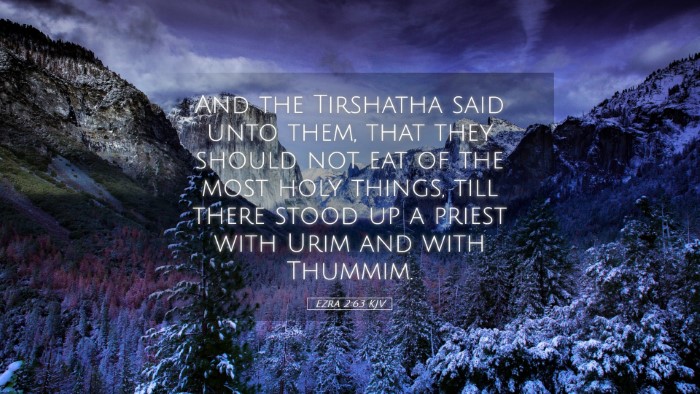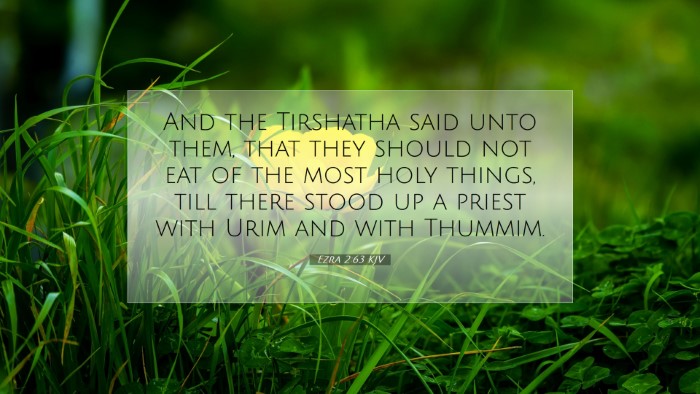Commentary on Ezra 2:63
Ezra 2:63, which states, "And the governor said unto them, that they should not eat of the most holy things, till there stood up a priest with Urim and with Thummim," captures a significant moment in the return of the exiles from Babylon to Jerusalem. This verse emphasizes the necessity of proper worship and the role of the priesthood in Israel's religious practices.
Historical Context
Ezra and Nehemiah gather the people for the rebuilding of Jerusalem and its temple after a lengthy exile. The awareness of divine ordinances and worship regulation was paramount, especially in rebuilding a national and spiritual identity. Understanding this context allows us to appreciate the weight of the governor's statement in verse 63.
Insights from Matthew Henry
Matthew Henry, in his commentary, highlights the importance of the priesthood during this time of restoration. He points out that the absence of a priest equipped with the Urim and Thummim, two objects used by Old Testament priests to discern God’s will, rendered the community’s worship incomplete. Henry emphasizes that without proper priestly guidance, the people were prohibited from partaking in the most sacred offerings:
-
Spiritual Leadership: Henry notes how critical it is for spiritual leaders to be in place for public worship to be valid and acceptable.
-
Holiness and Order: The restriction reflects God’s character and the essential call to holiness in worship practice.
Insights from Albert Barnes
Albert Barnes provides further detail on the mechanism of worship in this period. He asserts that the Urim and Thummim were crucial for determining divine direction, which underscores a theological principle—the necessity of divine revelation in religious practices. In his analysis, Barnes explains:
-
Divine Communication: The absence of the priest with the Urim and Thummim signifies the need for direct communication with God for guidance.
-
Communal Responsibility: The community bore a collective responsibility to ensure that their worship was aligned with God’s instructions and governed by those called to lead them spiritually.
Insights from Adam Clarke
Adam Clarke elaborates on the implications of the verse for Israel's future worship. He discusses how the Urim and Thummim were more than ceremonial items; they represented the light and perfection of divine knowledge. Clarke’s insights shed light on:
-
Importance of Prophecy: Clarke indicates that without prophetic authority, the people were left without a means to discern God's will, which could lead to confusion in worship practice.
-
Establishment of Order: This verse calls attention to the necessity of order in worship. Clarke sees this as a foundational element for all future worship services that would follow, establishing practices that honor God’s holiness.
Theological Implications
The theological threads woven through Ezra 2:63 lead to significant implications for understanding worship and leadership in the church today. Each of the commentaries reflects a nuanced view of how the absence of priestly order affects worship:
-
Leadership's Role: This verse serves as a reminder of the critical role of church leaders in guiding congregational worship, as they are the mediators of God’s presence today.
-
Requirements for Worship: Worship must be conducted according to the standards set forth in Scripture. The community, like the returning exiles, benefits from established practices that ensure their worship is meaningful and correct.
-
Unity in Worship: The congregation’s unity in worship, as articulated by these commentaries, underscores the necessity of collective compliance in matters of worship, reflecting a community committed to seeking God's presence.
Conclusion
Ezra 2:63 not only records a historical moment but also serves as a profound lesson on the nature of worship and the essential role of leadership in the community of faith. The insights from Henry, Barnes, and Clarke collectively emphasize that worship is not only an individual endeavor but one that requires communal alignment and divine guidance. As pastors, students, and theologians reflect on this commentary, may they be encouraged to uphold the principles of holiness, order, and leadership in the worship settings they inhabit.


